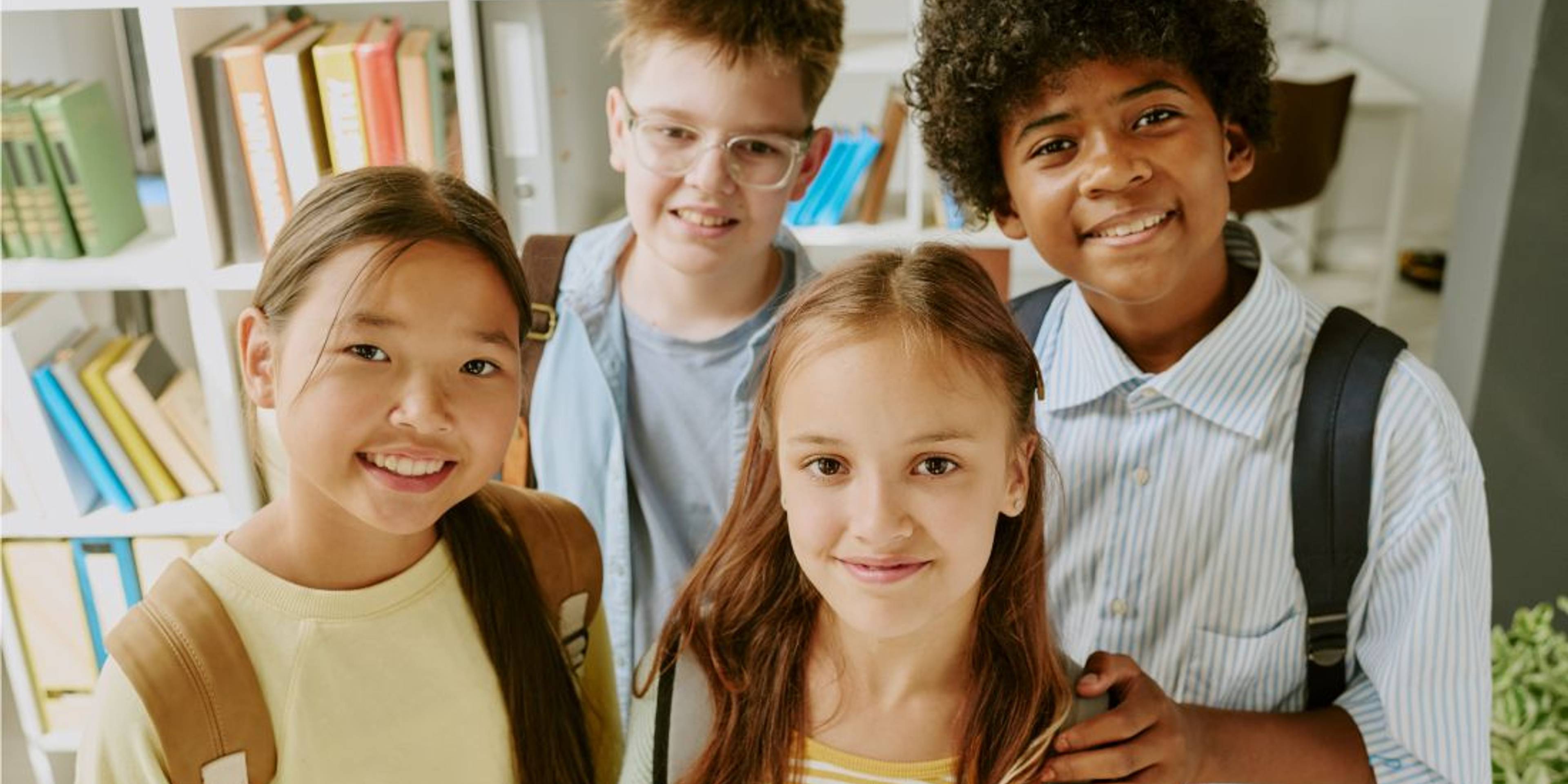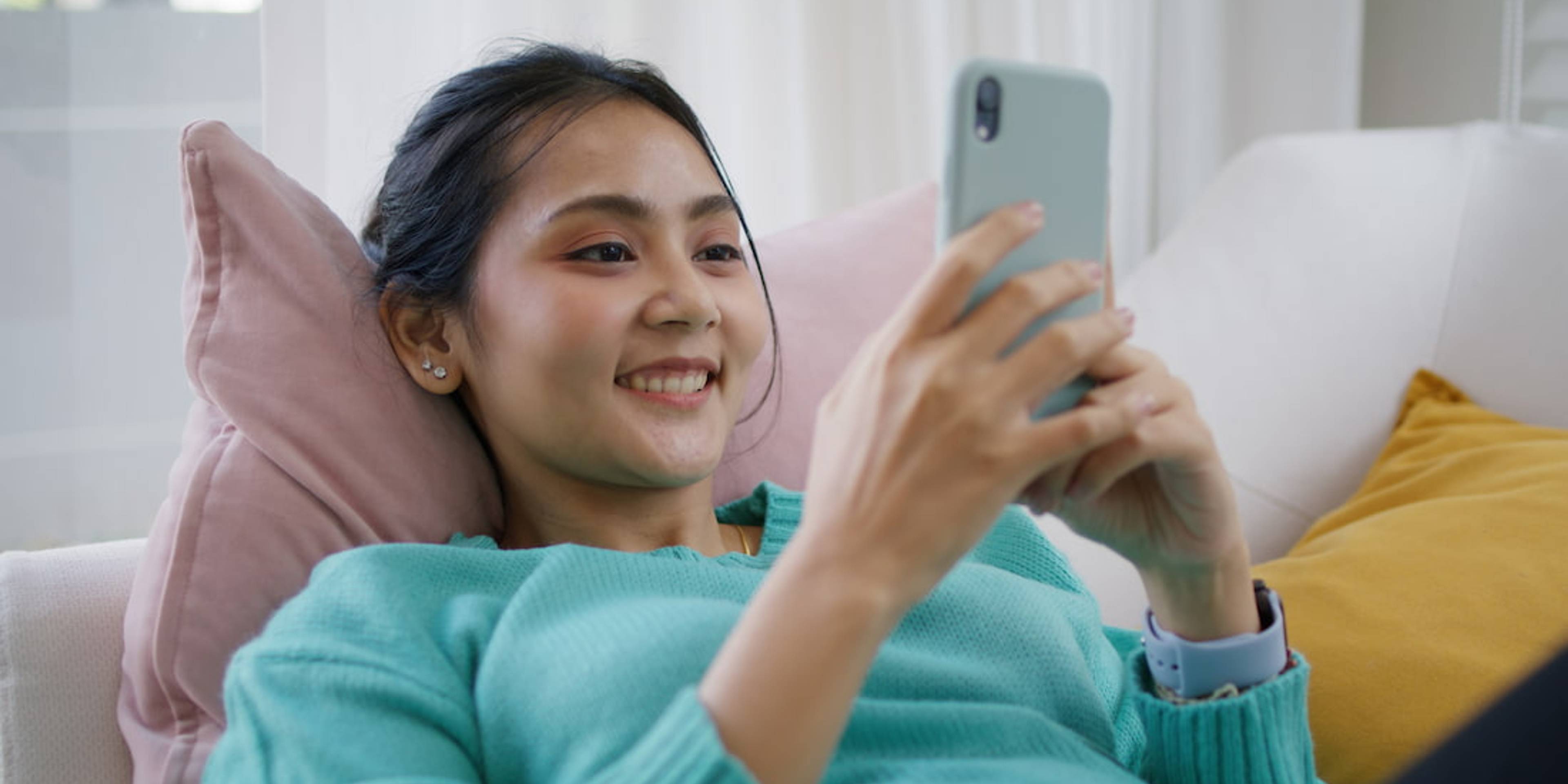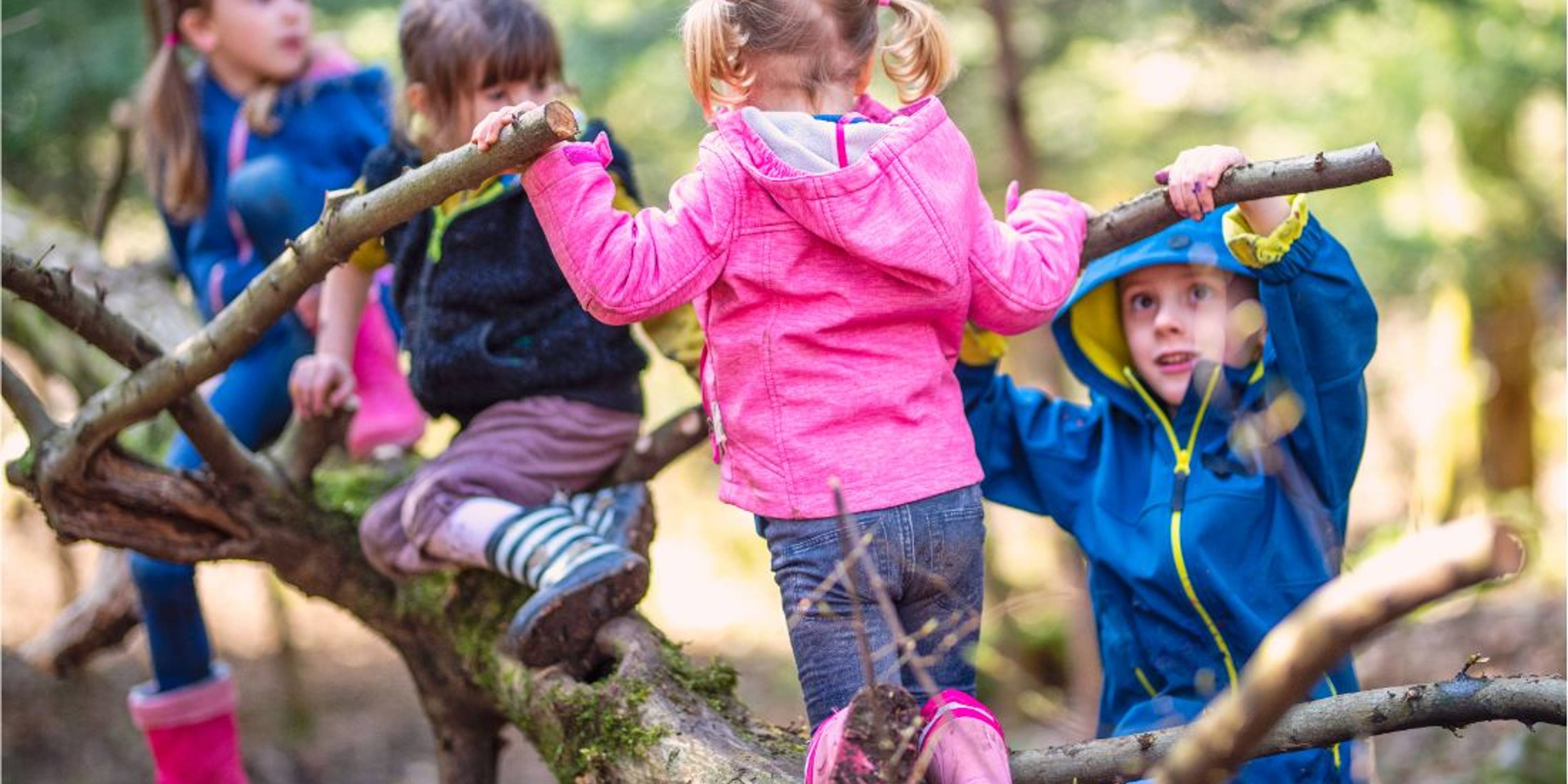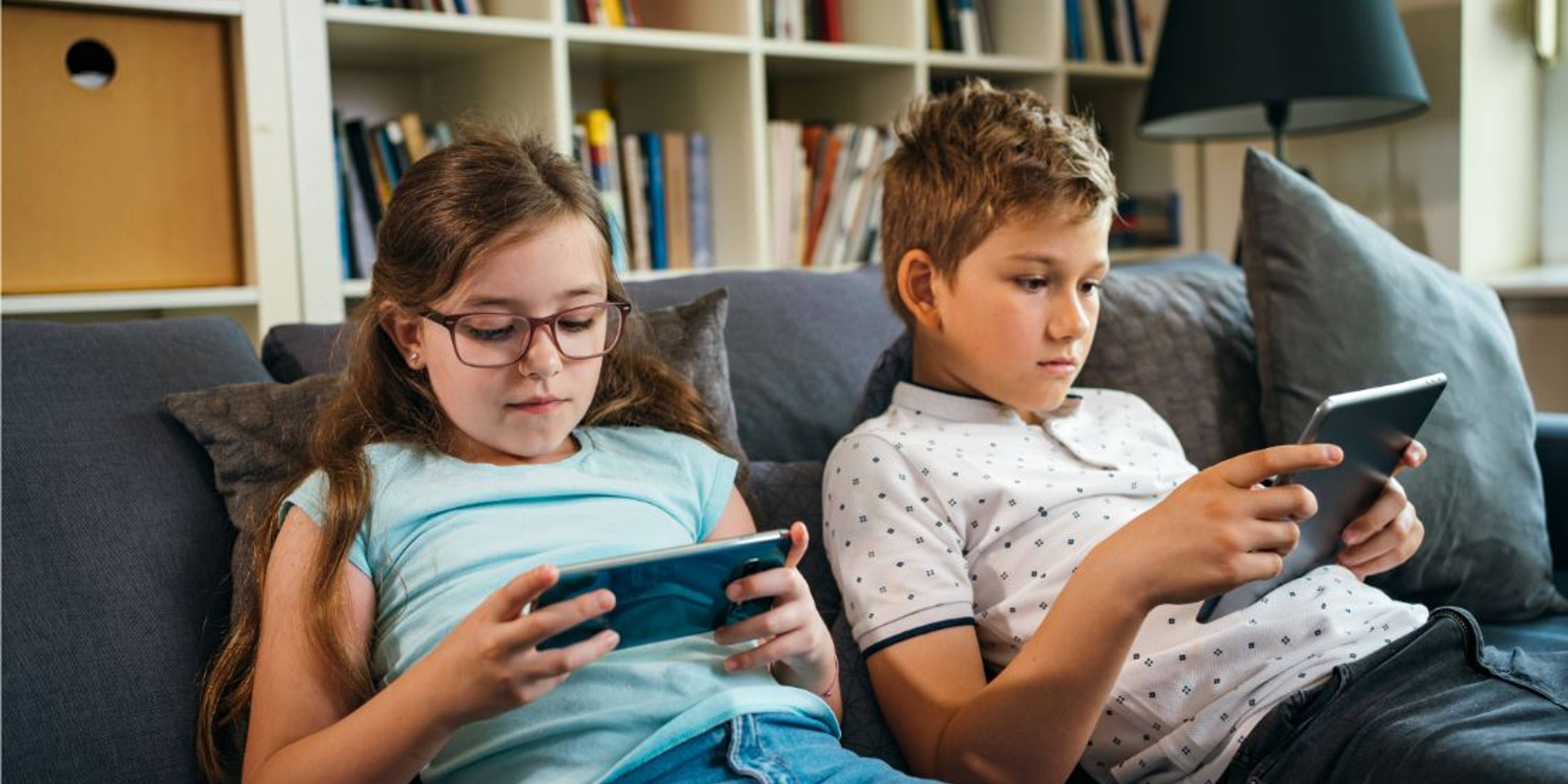June 17, 2025
Navigating the feed: younger adolescents' reflections on algorithmically curated social media

Our latest researcher of the month, Roxana Pomplun, has investigated the interactions, experiences and perceptions of younger adolescents, aged 11, 12, and 13, with algorithmically curated platforms such as TikTok, YouTube Shorts, Spotlight on Snapchat and Reels on Instagram. These kinds of platforms use algorithms to personalise and tailor feeds, harnessing user data to suggest content that the individual is most likely to be interested in and engage with. As such, young people have little control over what they are seeing in their feeds. Tech companies are not yet required to be transparent about the data that they are collecting, but it tends to include demographic information such as age, gender or location, along with use patterns.
Whilst these sites dominate the digital lives of tweens and teens, until now they have received little dedicated research attention, particularly in relation to younger users, with most existing studies focusing on older teens.
Whilst we know that most social media platforms have age limits of 13, we also know that many younger children are active users, particularly of algorithmically curated platforms like TikTok and YouTube Shorts. Given that early adolescence is a life phase marked by critical neurological development, identity development and heightened susceptibility to mental health issues, deepening our understanding of how younger adolescents engage with social media is vital.
Roxana's qualitative research, where a group of young people eloquently explore their own experiences and perceptions, broadens our knowledge of social media use within an age group that appears increasingly aware of the digital influences shaping their online experiences, yet which is still in need of support to fully navigate these ecosystems.
Summary
Keen to centre children's voices, Roxana interviewed 19 UK-based young people (nine boys, nine girls and one non-binary adolescent) aged between 11 and 13. All participants were active users of at least one social media platform, and each spoke with Roxana twice during semi-structured interviews. To prompt and deepen conversations, participants were invited to bring screenshots or saved images and videos of anything that they thought interesting during their social media use, or which triggered strong feelings.
Roxana found that the young people in her study were very keen to explore their experiences of social media and very open about their perceptions and experiences. A set of mixed feelings emerged about their social media use. Using her data, Roxana constructed the 'Adolescence Algorithmic Interactions Theory'. It consists of three core concentric layers which categorise the most commonly emerging themes and experiences. She has termed these, ‘digital ecosystem fluidity’, ‘temporal immersion’ and ‘algorithmic mindfulness’. The theory illustrates how younger adolescents perceive, experience and manoeuvre the complex landscape of algorithmically driven social media, highlighting both challenges and potential self-regulatory strategies.
The young people discussed the interconnectivity of platforms (digital ecosystem fluidity), and the way that content - especially short-form videos - migrates across different platforms such as TikTok, YouTube Shorts, Snapchat Spotlight and Instagram Reels. Despite this similarity in content, the young people in the study identified a hierarchy of social media platforms, with TikTok being considered the best, and the one that they all wanted to be on (though some were not allowed by their parents). The participants generally displayed a good understanding of social media recommender algorithms and how these might influence our own behaviour, and they uniformly considered TikTok to have a superior algorithm and better personalisation when compared to other platforms. They felt that TikTok provides the best and most tailored user experience, is faster at picking up on what they want to see, and is where trends appear first.
As a business and design model, algorithmically curated social media relies on both surprise and on triggering strong emotions in order to keep users engaged. The young people interviewed all reported experiencing unpleasant or mixed feelings when using social media, due in part to the sense that they easily lost track of time (temporal immersion). This was often accompanied by feelings of guilt for being on platforms for too long, or a sense that they lacked control over their behaviour. Many of the interviewees also felt that social media negatively impacted their attention span, or reported that their parents told them so. Having minimal control over the videos that they watched, they described how they might see something funny, followed by something happy, followed by something political, then something odd, then something sad, all in quick succession, and that this impacted their emotions. They noted that the speed of transition between this unexpected content could at times feel exhausting, leaving them, in Roxana’s words, variously 'delighted and distressed', creating an emotional turbulence that some found challenging to manage.
Whilst some young people described feeling powerless against the algorithm, others engaged in mainly subconscious reflective behaviours which aimed to give them agency over the algorithm - something that Roxana terms algorithmic mindfulness.
Some chose to avoid the algorithm. One girl, for example, described how, whilst she wanted to use TikTok, she didn’t like being shown things that she had no control over. So rather than using the default ‘For You’ feed, which is algorithmically curated, each time she opened the app, she selected the ‘Following’ feed, which only showed accounts that she had actively chosen to follow.
Some tried to influence the algorithm. When faced with content that made them feel uncomfortable or sad, they would scroll past quickly, or tag it as not of interest. They felt that this strategy meant that similar material did not come up as frequently. It’s important to note that because of opacity in algorithm design, we don’t really know if this strategy is effective, but it gave the young people a sense of agency.
Some created physical distance from their phone. Some of the young people began to charge their phone on the other side of their room at night to remove the temptation of scrolling in bed. Others asked their parents to look after their phone for them at times, to keep them off it.
Some removed the apps! During the research, one participant deleted her TikTok account, as a personal experiment to see how she felt without it. This particular girl felt better able to focus at school and that she was generally using her time more productively. However, she also felt that she was missing out on trends and this made her feel excluded from some of the things that her friends were doing.
Some sought parental support. Encouragingly, some participants reported seeking out their parents to talk about things that they saw online.
Interestingly, in Roxana's study, not all platforms were equal. Pinterest emerged as a site associated with more mindful and intentional use. The young people who used Pinterest (who were mainly, though not exclusively, girls) did so for specific purposes, such as learning the piano, finding room decoration inspiration, or to fuel their interest in dressmaking or crochet. It seemed to be perceived completely differently to the short-form video platforms that they also used a lot, and was not associated with emotional turbulence or challenging feelings. This might indicate that there is space for the future use or regulation of algorithmic design that relies less on emotionally provocative content.
Implications
What can parents do?
It’s not always easy, but where possible, try to talk to children about their experiences. If you have allowed your young adolescent to access social media, then always try to remain open and non-judgemental, and don’t impart blame if things do go wrong online, or if they see something distressing. By engaging in these kinds of curious conversations, children and young people will gain greater awareness of the helpful reflective behaviours that they already use, and consider other strategies that might help them to get the most benefit from their social media use.
Try to understand the social media platforms that they use. Download them and try them out yourself. If your child knows that you have some comprehension of how the platforms they use work, one barrier to communication is removed, and they may find it easier to open up.
Explore issues around algorithmic literacy together. Our children may well know as much or more than us on this topic. Rather than trying to teach them, why not explore what they understand, establish knowledge limitations (for you both) and then work together to learn more? Remember, some young people will understand more than others about algorithms.
Talk about the business model. Ask what they think about the fact that not everything that they see on social media is something that they want to see. Do they think it’s right that the algorithm simply shows them whatever will keep them engaged for longest? Do they like seeing things that evoke very strong emotions? How can they avoid becoming stuck in a cycle of seeing material that is extreme, or which creates an echo chamber of the same views?
Boost their sense of self-efficacy online. We want our children to develop a belief in their ability to succeed in specific situations and achieve particular goals. Within Roxana’s study, some of the children expressed a sense of powerlessness in relation to their social media use. We can help them to see that there are small things that they can do. They are not totally at the mercy of the algorithm! Cultivating this sense of self efficacy, and encouraging them to try out small changes and reflect on their impact, are great steps on the way to self-regulation.
Check out the Center for Humane Technology’s Take Control Toolkit. Both teens and adults can use the steps outlined here to improve digital wellbeing and regain control of their feeds. The Center for Humane Technology website also features numerous other helpful resources.
What about at school?
Digital literacy lessons in school seem to be working! Whilst this is a small study, and Roxana wasn't focusing on the impact of digital literacy education, the children involved seemed to understand a great deal about data protection, online safety and the workings of algorithms.
Expanding lessons to incorporate digital ethics and a more philosophical approach would be beneficial. Many of the issues surrounding technology use and social media are societal and systemic. Integrating digital literacy content across the curriculum and considering broader related concepts, such as ethics, ideology and politics, through open, philosophical questioning will help to strengthen critical thinking.
Consider integrating an algorithmic literacy qualification. Dr Lizzy Winstone’s recent report suggests introducing a compulsory Key Stage 4 qualification in digital media and algorithmic literacy for all young people across the UK. She advises that this must extend beyond functional skills to critical literacy, with curriculum input from both experts in technology and AI, and experts in media literacy, public health, psychology and sociology.
Tooled Up members can listen to our interview with Roxana Pomplun here. Remember, if you are a Tooled Up member, you also have access to our whole platform, which is packed with evidence-based resources designed to support children in the digital world.

Roxana Pomplun
PhD researcher in Applied Health Research at the University of Kent
Roxana has just passed the viva voce for her NIHR-funded PhD in Applied Health Research at the University of Kent. Her research has focused on younger adolescents’ (aged 11-13) interactions with algorithmically curated social media, particularly short-form video platforms (e.g. TikTok, YouTube Shorts). Roxana has now started working as a Child Safety Researcher at ActiveFence, continuing her aspiration for making the internet a safer place for children and young people.
Roxana Pomplun
PhD researcher in Applied Health Research at the University of Kent
Related Resources
Scroll our research gallery

Feb 17, 2026
Children's Experiences of ADHD
While there have been many empirical studies of childhood ADHD, there have been few qualitative studies investigating first-hand accounts of the lived experiences of children. Much of the literature focuses on the perspectives of parents or teachers, rather than centring children’s voices. But what are children's thoughts, feelings and experiences? Our latest Researcher of the Month, PhD candidate Daphne Ling, has recently published findings which begin to address this research gap.

Jan 19, 2026
The power of reading: books, vocabulary and learning
Did you know that 2026 is the UK’s National Year of Reading? This long-overdue initiative reflects growing concern and renewed commitment around children’s reading and literacy. As Dr Maria Korochkina, our latest Researcher of the Month, puts it: “The ability to read opens up worlds. Reading enables children to progress into post-primary education and provides the basis for lifelong learning and prosperity into adulthood”. Frequent readers tend to have a stronger understanding of both their own and others’ emotions. They are often better able to communicate these emotions, a skill linked to higher emotional intelligence and improved mental wellbeing. Reading also encourages cause-and-effect reasoning and helps children imagine scenarios beyond the immediate moment - developing the skill of -future-thinking'. A rich vocabulary underpins learning across the school curriculum, strengthens thinking and communication skills, and predicts both academic attainment and later life outcomes. Research consistently shows that the most effective way to build vocabulary is through reading. However, learning to read well is not quick or effortless. The journey to skilled reading typically spans around ten years, requiring high-quality classroom instruction alongside sustained practice through independent reading. For many children, this process is painstaking, demanding consistent teaching, encouragement and opportunity over time. Against this backdrop, recent evidence presents a worrying picture. Fewer children are reading for pleasure than ever before. In 2024, only one in three UK children and young people aged eight to 18 reported enjoying reading in their free time. Even more strikingly, just one in five said they read daily for pleasure, the lowest level recorded since the National Literacy Trust began collecting this data in 2005. This matters because reading ability and reading enjoyment are deeply intertwined. Children who find reading effortful are far less likely to choose to read independently. Dr Korochkina’s research highlights how early reading experiences shape later habits: difficulties with phonic and morphological knowledge in the early stages of reading acquisition can have a snowball effect, reducing confidence, fluency and motivation over time. Her work also offers a powerful note of optimism. Books that children actively choose to read, including contemporary, popular texts, provide rich opportunities to develop vocabulary, particularly when children read widely. Ensuring access to a diverse range of engaging reading material, alongside strong early instruction, can play a vital role in building both reading skill and reading motivation. Fostering confident, motivated readers requires long-term commitment. It is not enough for children simply to have books available to them. They need skilled teaching, time, practice and a culture that values reading as both a skill and a pleasure.

Dec 15, 2025
Crossing the line into cybercrime
As the most digitally connected generation so far, young people today face new challenges. Our latest Researchers of the Month, Professor Davidson and Dr Farr, have found that in the last decade, an increasing number of young people (particularly young men) have committed serious cybercrime offences, particularly hacking and money laundering. Their new book, written following a large research project funded by the European Union’s Horizon 2020 research and innovation programme, seeks to understand the drivers behind this trend. It explores a range of potential factors that may lead young people to engage in risky online behaviours, and to identify effective pathways for prevention.

Nov 16, 2025
Supporting Children’s Use of AI
Children and young people are now growing up surrounded by AI, and the landscape is shifting fast. In the UK, recent data from Ofcom and Internet Matters suggests that around half of children aged 8–17 regularly use generative AI tools such as ChatGPT, Bard or Snapchat’s MyAI. Many describe these interactions as feeling like conversations with a friend. A recent report from Common Sense Media found that 33% of teens had actually chosen to talk to an AI companion instead of a real person about something important or serious. Whether children are asking voice assistants to answer their questions, relying on chatbots for bedtime stories, using learning apps for revision or engaging with large generative AI models, it’s essential to remember that most of these systems were built with adults in mind, not children. They often assume levels of attention, memory and emotional maturity that younger users simply don’t have. Even older children and teenagers, who increasingly use AI as a supportive confidante (often without adult supervision or knowledge), are still learning to navigate boundaries around trust, identity and emotion. Our latest Researcher of the Month, Dr Nomisha Kurian, wants this to change. She has developed a new framework called Developmentally Aligned Design (DAD), which outlines how AI can be built with children’s needs, vulnerabilities and strengths at its core. She also chatted to us at Tooled Up, sharing practical tips on recognising when children may be relying too heavily on AI for emotional connection, how to talk to them about healthy boundaries, and how parents and educators can help children and young people use AI tools safely, creatively and critically.

Oct 16, 2025
Algorithmised Girlhood: Teenage Girls and TikTok
As part of the early stages of her PhD study, our latest researcher of the month, Chiara Fehr, ran several focus groups about experiences of TikTok with eight 17 year old girls. Using creative methods, such as ‘TikTok show and tells’ a collaging session and a utopic mapping exercise, Chiara is exploring whether dominant narratives around growing up in a digitised world reflect the real life experiences of teens, and has summarised her findings so far in a recent article.
![“[They use devices] alllllllll day long”. What do children think about our tech use?](https://cdn.sanity.io/images/jxfh43in/content-prod-d2c/79f219275088655f59590f61ff29b6bc8b0d77f8-1100x733.jpg?w=3840&h=1920&q=70&fit=crop&crop=center&auto=format)
Sep 09, 2025
“[They use devices] alllllllll day long”. What do children think about our tech use?
We're all used to reading about children and young people's increasing use of digital tech. But what about adults' use? And what impact might our tech use have on family life? Parents today are spending an unprecedented amount of time on their devices. One study found that parents spend an average of nine hours per day engaged with screen devices. Over four hours of this is on smartphones, averaging 67 phone checks per day. Despite children's central role in family life, their voices and perspectives on the device use of the adults around them have been largely neglected in research. Along with colleagues, our latest Researcher of the Month, Professor Cara Swit, has published a fascinating study exploring the experiences and perceptions of children aged six to nine about their parents’ device use at home and its impact on them.

Aug 13, 2025
Students’ views on smartphone bans
In recent years, banning or restricting children’s access to smartphones and social media has grasped the attention of policy makers, schools and parents. A number of countries, including France, Turkey, Norway, Sweden, and regions of the US and Canada have introduced laws, policies or guidance for schools to ‘ban’ or heavily restrict the use of phones. Within Ireland, in 2024, the Minister for Education announced her intention to introduce smartphone bans in post-primary schools, whilst at the same time acknowledging that individual schools are best placed to decide on the scope and scale of restrictions for their students. Whilst these bans aim to protect children from harm, and teachers often anecdotally report seeing benefits, evaluations of existing research highlight a lack of evidence on their efficacy. At the moment, we simply don't know enough about the impact of bans. Evidence is hampered by the fact that technological developments and technology use is moving at a faster pace than research. Some studies suggest that bans are beneficial to academic outcomes and mental wellbeing. Others suggest no effects. However, many studies have methodological weaknesses, use small samples or retrospective data, and can't ascribe causal mechanisms. Our latest Researcher of the Month, Dr Megan Reynolds, has recently published a paper which explores young people's perspectives and experiences of smartphone bans in their schools. Unlike most previous research, it centres student voices in this high profile issue.

Jul 14, 2025
Do teens with mental health conditions use social media differently than their peers?
As Luisa Fassi, our new Researcher of the Month, comments, "The link between social media use and youth mental health is hotly debated, but hardly any studies look at young people already struggling with clinical-level mental health symptoms". In fact, Luisa's large systematic review and meta-analysis found that only 11% of papers published on the topic since 2007 focused on young people with clinical conditions. Her review also showed that the data used to evidence mental health conditions in these existing studies is not always strong or especially robust. Many report links between social media and mental health on the basis of short self-report questionnaires, where young people are asked about symptoms. Whilst this wasn't found as part of Luisa's review, it is also the case that very few papers in the field differentiate between different mental health conditions, or examine different symptoms or conditions (such as anxiety, ADHD or eating disorders) in isolation. To address this research gap, Luisa and colleagues have recently published a fascinating and nuanced paper. It analyses both quantitative and qualitative dimensions of social media use from a nationally representative survey of 3,340 teens in the UK aged between 11 and 19 years old, which was conducted by NHS Digital in 2017. Rather than gathering mental health data from self-report questionnaires, the young people in the survey underwent a full clinical screening, which included interviews with the young people, their parents and teachers. Information about social media use came from questionnaires completed by participants. They were not asked about specific platforms. Luisa used this data to gather novel insights into how social media and mental health are related in teens who both meet and do not meet diagnostic criteria for a wide range of mental health conditions. The study does not establish any causal links, but it does reveals a range of differences between young people with and without mental health conditions when it comes to social media.

May 15, 2025
Looking beyond smartphone bans
Over the last year or so, there has been a surge in public concern around smartphones and social media. Banning or restricting children’s access to smartphones and social media has grasped the attention of policy makers, schools and parents. A number of countries, including France, Turkey, Norway, Sweden, and regions of the US and Canada have introduced laws, policies or guidance for schools to ‘ban’ or heavily restrict the use of phones. In the UK, there are proposals to raise the age of ‘internet adulthood’ from 13 to 16, and to ban smartphones in schools. The third reading of a private members’ bill on this topic will be heard in parliament in July. Whilst these bans aim to protect children from harm, recent studies highlight a lack of evidence on their efficacy. Along with a team of international experts, our latest Researcher of the Month, Professor Victoria Goodyear, argues that, in isolation, banning smartphone and social media access fails to equip children for healthy use of technology. She suggests that there is a need to shift debates, policies and practices away from a sole focus on restricting smartphone and social media access, toward an emphasis on nurturing children’s digital skills for healthy technology use, and a rights-respecting approach which is underpinned by age-appropriate design and education.

Apr 22, 2025
Encouraging adventurous play in the preschool years
Tune into our podcast interview with April's researchers of the month here. As well as providing numerous opportunities for exploration, joy, and expression, outdoor and adventurous play - the type of play that allows children to take age-appropriate risks - is associated with a range of positive health behaviours and outcomes. Yes, we're talking about the kind of play that might leave us adults with our hearts in our mouths at times, as children start to disappear up a tree, or engage in a rough and tumble game of chase. But its benefits are wide-ranging and known impacts include increased levels of habitual physical activity alongside better mental health and positive mood. In 2019, Dr Hesketh was involved in the creation of physical activity guidelines in the UK, which explicitly note the importance of outdoor play for children in the preschool age group. We know quite a lot about the play habits of school-aged children, but until now, have had significantly less data on their younger counterparts. Our Researchers of the Month, Dr Kathryn Hesketh and Professor Helen Dodd set out to discover how much time preschool-aged children spend playing in a range of indoor and outdoor spaces, and how adventurously they are playing within them. In the first national survey of play in children of this age, they asked over 1000 parents of two to four year olds about their children’s play habits, finding that, on average, children aged two to four spend around four hours per day (outside of educational settings) playing. Just under 50% of this was spent playing outdoors. Their findings shed interesting light on some inequalities in play, even in the youngest age group, which may exacerbate existing inequalities in health.




